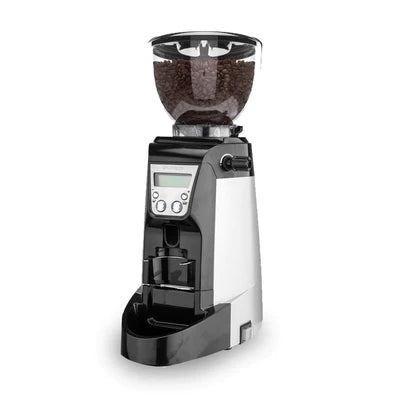Industrial Coffee Grinder for Large-Scale Brewing: A Necessary Tool
Industrial Coffee Grinder Guide: Boost Performance and High Quality
In the affordable landscape of coffee manufacturing, picking the right industrial coffee mill plays a critical role in enhancing both efficiency and product quality. Understanding the subtleties of different mill kinds and essential features-- such as adjustable work setups and robust building-- can significantly influence the last taste profile of the coffee.
Recognizing Grinder Kinds
When choosing a commercial coffee mill, recognizing the numerous types available is vital for enhancing both taste extraction and functional effectiveness. The 2 key kinds of grinders are blade mills and burr mills.

Eventually, choosing the right type of mill is important to preserving high quality and performance in coffee manufacturing, making it imperative for organizations to spend in high-grade burr mills for optimum results.
Key Features to Take Into Consideration
Picking an industrial coffee mill requires careful factor to consider of several essential functions that can substantially affect both performance and the total coffee experience. One of the primary aspects to review is the grinding device. Burr mills are usually liked over blade mills, as they supply a regular work size, which is essential for optimum removal and flavor.
One more important feature is the mill's capacity. Depending on the quantity of coffee you need to process, select a version that can manage your demands without compromising rate or quality. In addition, take into consideration the grind setups supplied. A versatile mill with numerous settings permits you to customize the grind size to different developing methods, boosting the coffee's flavor account.
The building material additionally contributes in durability and maintenance. Stainless-steel parts frequently provide longevity and are easier to cleanse, which is crucial for maintaining hygiene criteria. Last but not least, examine the grinder's sound level, especially in an active coffee shop or production environment, where extreme noise can be disruptive. Purchasing a grinder that stabilizes these functions can substantially improve both operational performance and the quality of the coffee offered.
Optimizing Grinding Refine
To achieve the best results in coffee preparation, enhancing the grinding procedure is important. The grind dimension dramatically affects removal, taste, and overall quality of the brewed coffee.


In addition, monitoring the grinding speed can enhance the process. Slower grinding typically produces less warmth, preserving delicate tastes and fragrances. Alternatively, much faster grinding may produce extreme warm, negatively impacting the coffee's quality.
Maintenance and Care Tips
Proper maintenance and treatment of commercial coffee mills are essential for ensuring optimum efficiency and durability. Routine cleaning is the foundation of maintenance; deposit build-up can impact flavor and grinding performance. It is suggested to cleanse the mill after each use, wiping down the exterior click resources and eliminating any type of coffee grounds from the burrs.
Additionally, inspect the grinding burrs for deterioration. Boring burrs can jeopardize grind uniformity, so they ought to be replaced as essential. Industrial Coffee Grinder. Occasionally adjusting the grinder is additionally critical, as this preserves the wanted grind dimension for different brewing approaches
Lubrication of relocating parts need to be done according to the producer's specifications, as this minimizes rubbing and lengthens the life of the devices. It is important to utilize food-grade lubricating substances to guarantee security and compliance with health guidelines.
Finally, keep the grinder in a steady and dry setting to avoid corrosion and rust. By sticking to these upkeep and care tips, drivers can boost the effectiveness of their commercial coffee grinders while making sure top notch result and prolonged operational life.
Return on Financial Investment Evaluation
Examining the return on investment (ROI) for commercial coffee grinders is important for services looking for to enhance their coffee production capabilities. A complete ROI evaluation assists figure out the economic practicality of spending in top notch mills, permitting organizations to evaluate the first expenses against potential gains.
To perform a detailed ROI evaluation, services ought to think about numerous key aspects. Analyze the purchase rate of the mill, consisting of installation and any kind of necessary modifications to existing facilities. Next off, calculate functional expenses, consisting of energy usage, maintenance costs, and labor efficiency improvements. High-performance grinders frequently lead to decreased grinding time and enhanced throughput, which can considerably enhance productivity.
Furthermore, think about the influence on item top quality. Industrial Coffee Grinder. Superior grinders produce an even more regular work size, which can enhance taste accounts and client complete satisfaction, ultimately driving sales. By raising the quality of the end product, services can justify greater pricing, causing boosted revenue
Verdict
In summary, an industrial coffee grinder plays a critical role in enhancing both efficiency and product quality within coffee manufacturing. Inevitably, the strategic financial investment in a reputable grinder adds significantly to improved revenue and competition in the coffee sector.
In the affordable landscape of coffee manufacturing, choosing the ideal industrial coffee grinder plays a pivotal duty in enhancing both efficiency and item top quality. The 2 main types Look At This of mills are blade grinders and burr grinders. Within the burr mill classification, there are flat burr grinders and conelike burr mills, each with its advantages. Burr mills are normally chosen over article source blade grinders, as they give a consistent grind dimension, which is essential for ideal extraction and taste.
In recap, an industrial coffee mill plays an essential function in enhancing both performance and item high quality within coffee production.